Germany after 1 year of 'tasting' Covid-19
(Baonghean.vn) - The first case in Germany tested positive for the new strain of Corona virus (Covid-19) in late January 2020. The following year changed Germany, and the rest of the world, in many ways.
THE “FIRSTS”
At the time of January 27, 2020, for many Germans, it was still thought that the year ahead would be peaceful, without many significant changes. But since the news that an employee working for a company in the suburbs of Munich, which has close trade with China, tested positive for Covid-19, almost everything began to change.
The past year has seen Germans, like most of the world, stop exchanging familiar gestures like handshakes and hugs. They stay at home, avoiding contact with others. New words invade daily life: morbidity, infection rate, quarantine, intensive care unit, excess mortality, social distancing, face masks…
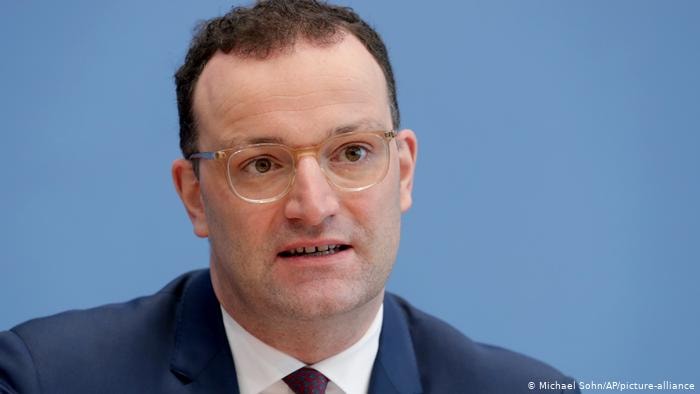 |
| German Health Minister Jens Spahn's approval rating has risen during the pandemic. Photo: AP |
Before the first positive case, most people did not know that the highest infection control agency in Germany was the Robert Koch Institute, but a year later, it was a common knowledge. Virologists, such as Christian Drosten at Berlin’s Charité Hospital, became “national” experts. German Health Minister Jens Spahn was the highest-ranking official in the political world. “In a few months, we will have to forgive each other a lot,” Spahn told the Bundestag on April 23, 2020.
Looking back at that time, in January 2021, Spahn told DW: “We took it very seriously and adjusted our systems accordingly. But I don’t think anyone dared to imagine that the situation would develop like this in the next 12 months, in Germany, in Europe, all over the world. And that it still dominates our lives.”
During that time, in Germany there were more than 50,000 peopledeaths from Covid-19And the virus continues to dominate everyday life.
As mentioned above, at the beginning of last year, the problem of Covid-19 seemed “distant” to Germany, but everything changed dramatically. The country had its first death on March 8. Two days later, cases appeared in all 16 states. After a Carnival festival, the city of Heinsberg in North Rhine-Westphalia became Germany’s first major outbreak.
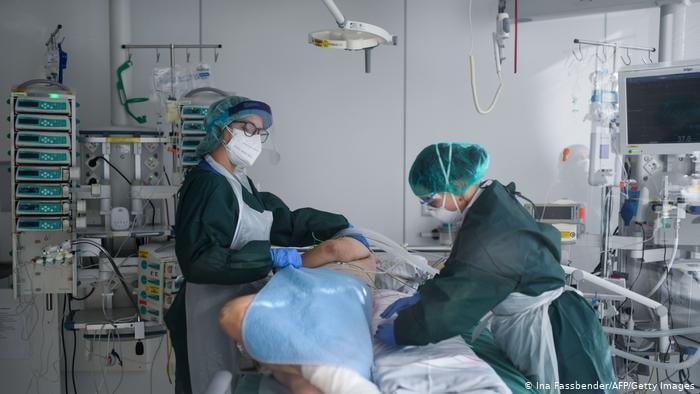 |
| Over the past year, Germany has recorded 50,000 deaths related to Covid-19. Photo: AFP |
INITIAL SUCCESS
March 18,Chancellor Angela Merkelgave a televised speech, in words that could hardly have been more drastic: “The situation is serious, let us take it seriously. Since German unification, no, since World War II, this country has not faced a challenge that required us to act in such a united and unified way.”
A few days later, drastic measures were introduced, and a new word appeared widely: lockdown. Restaurants and cinemas were closed, schools and kindergartens were temporarily closed. Business activities were almost stagnant. The German parliament approved a "huge" rescue package of up to 156 billion euros for the economy, determining that this was not the time to implement a policy of "belt tightening". Travel plans were canceled, many people "tasted" working from home for the first time.
Supermarkets remained open, but only to those wearing masks. Panic buying and hoarding ensued. Some food items, even toilet paper, became scarce. Television images from towns and cities hard hit by Covid-19 in northern Italy also caused a stir in Germany. At that point, hardly anyone knew anyone directly affected, but the fear grew…
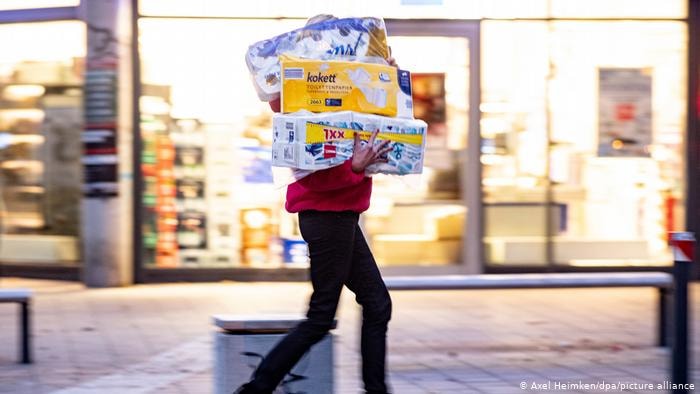 |
| News of last year's lockdown sent Germans rushing to supermarkets to stock up on supplies, with toilet paper becoming a scarce commodity. Photo: dpa |
But new “heroes” have emerged. They include supermarket cashiers, doctors, and nursing home nurses, hailed as frontline soldiers in the pandemic. Now, at the start of 2021, many nurses and healthcare workers are exhausted. In an interview with local media, Franz Wagner, president of the German Healthcare Workers’ Council, described the burden on the team as “enormous.” “This is reflected on the one hand in the large workload, and on the other in the fact that many of our colleagues are either quarantined or infected,” he said. “In addition to that, we have to live with and see high mortality rates in intensive care units and nursing homes.”
Objectively, Germany’s March 2020 lockdown was effective. Infection rates fell and German voters were satisfied with their government. Foreign media praised Germany’s efficiency and transparency. In fact, most citizens cooperated with the restrictions, which were less stringent than in Italy, Spain or France. Small gatherings were allowed, with little restriction on freedom of movement. People turned to cycling. The health system performed better than in many other countries.
As a result, by summer the infection rate had dropped and most restrictions were eased. But politicians had broken a fundamental rule: They had rested on their laurels!
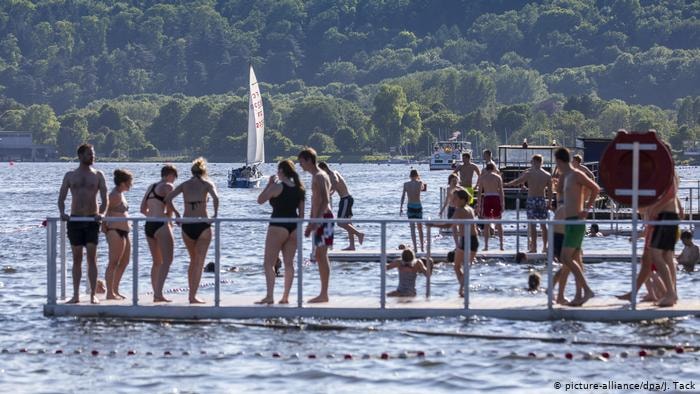 |
| Last summer, as infection rates dropped, many Germans let their guard down. Photo: dpa |
At that time, BioNTech - a Mainz-based pharmaceutical company, a partner of the US company Pfizer, said it was on track to develop a vaccine.Covid-19 vaccineThe United States quickly ordered several million doses of vaccine last summer, while the EU hesitated and decided to "bet" on several different manufacturers.
EXPENSIVE LESSON
Speculation began to emerge that, while Chancellor Merkel remained deeply concerned about the pandemic, many state premiers were pushing for further restrictions to be lifted. Gradually, schools reopened. So did restaurants, albeit under strict conditions. The economy slowly began to get back to work. Germany had fewer than 1,000 new cases a day in May 2020.
Many protests broke out, protesting the restrictions. A group calling themselves Querdenker – “the opposition” – said the measures were unconstitutional and violated citizens’ freedoms. But the majority of Germans still enjoyed the summer, despite the “inconveniences” such as masks and restrictions on gatherings. Soaking in the warm sunshine, many people had the illusion that the worst was over…
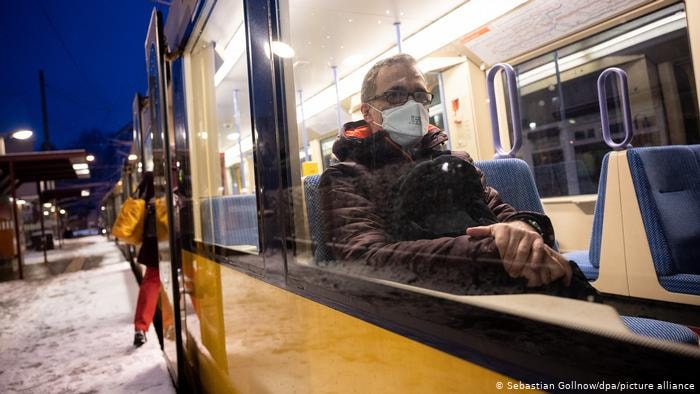 |
| Face masks have become a part of daily life in Germany. Photo: dpa |
As autumn arrived, signs of a second wave became clear. In early August, the number of new cases per day rose to more than 1,000. By mid-September, the number had doubled and by October 8, it was 4,000 a day. In late October, Merkel warned that unless action was taken, Germany would see 20,000 new cases a day by Christmas.
In fact, the threshold was reached much earlier. Then Germany went into a second lockdown in early November. Gatherings were limited to two households, pubs and restaurants were closed again; tourism was halted, as it had been in the spring. Shops and schools remained open. By the end of the year, Germany was launching its vaccination programme with the BioNTech/Pfizer vaccine, two weeks later than the UK because it took longer to get EU approval.
However, the vaccination program has had a rocky start, with logistics difficulties and production delays. Germany is no longer a shining example of infection control. Other countries, notably Israel, have taken over, far ahead of the rest in terms of vaccination.
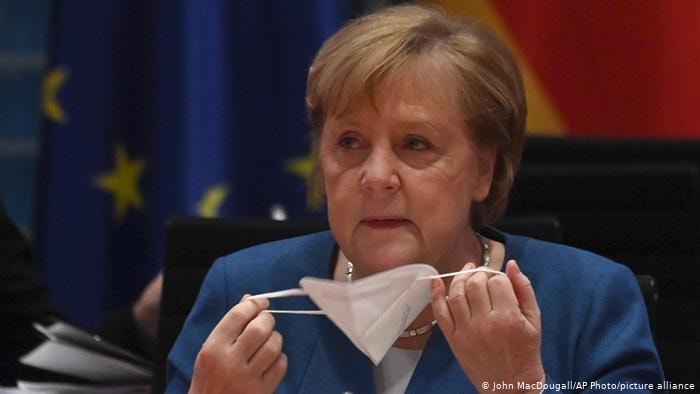 |
| The pandemic has left Ms. Merkel steering the country through turbulent waters in her final year as German Chancellor. Photo: AP |
Back in Berlin, Merkel declared the pandemic “the catastrophe of the century.” Restrictions were tightened again, officially in place until mid-February. The lockdown was effective, but only to a certain extent. The daily infection rate fell, but only slightly. Hope and confidence were gradually replaced by fear of a new, more contagious variant. The death rate remained shockingly high, especially in nursing homes. The only “lifeline” at the moment may be the federal government’s announcement that every German will have the opportunity to be vaccinated by next fall—a year and a half after Germany recorded its first Covid-19 case.

